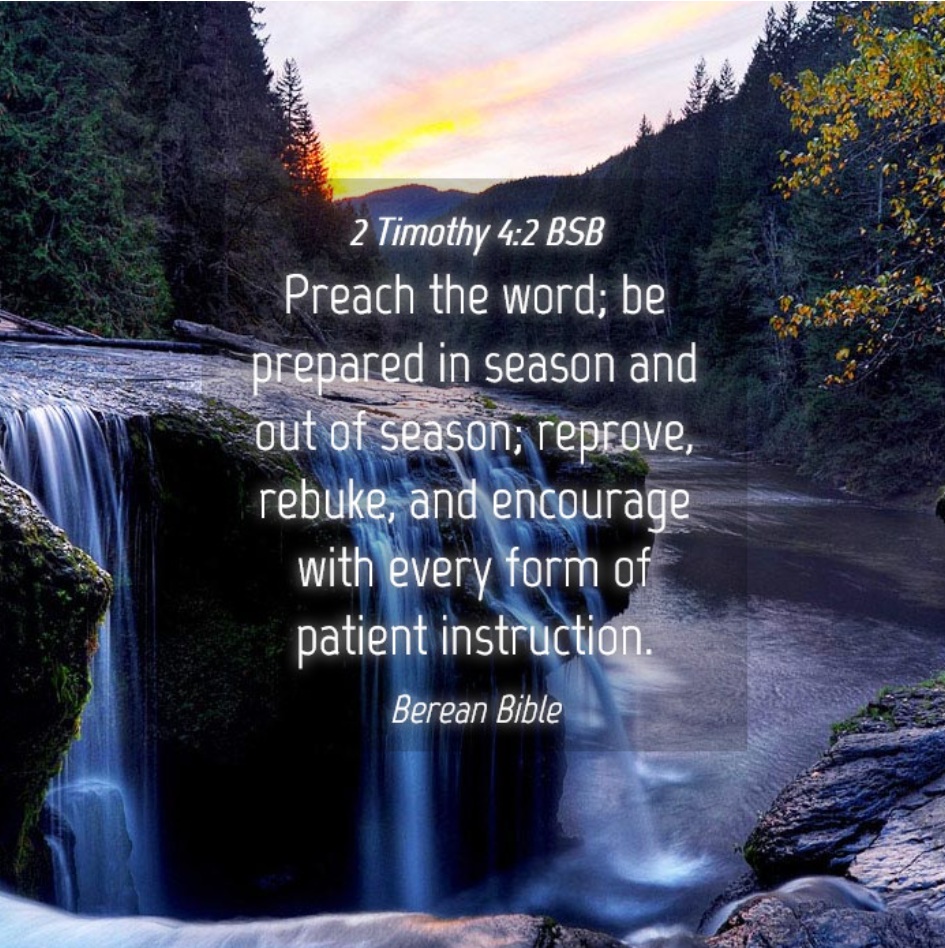“Go therefore and make disciples of all the nations…teaching them to observe all that I commanded you; and lo, I am with you always, even to the end of the age” (Matthew 28:19-20, NASB).
——————–
1) So, What’s a Good Sermon? (Jefferson David Tant)
2) What Think Ye? (Keith Hamilton)
——————–

-1-
So, What’s a Good Sermon?
Jefferson David Tant
Out of all the thousands of sermons preachers have delivered and to which people have listened, how would we determine which sermons are good, which are bad, or which are so-so? I would suppose that even preachers evaluate themselves from time to time, and on occasion might conclude, “Well, I’ll never preach that sermon again!”
In answering the question, it would be good to go to the “Preacher’s Manual,” which we would agree would be God’s Word. I doubt that any preacher would suppose that he could measure up to the Master Teacher, Jesus Christ, in His Sermon on the Mount; but there are various Scriptures that do mention preaching that is connected to the apostles and others in the New Testament writings.
For some helpful advice, let’s consider the words of one chosen by God to be a teacher, as he instructs a young preacher. Of course, we’re writing about the apostle Paul and the young man Timothy:
“I solemnly charge you in the presence of God and of Christ Jesus, who is to judge the living and the dead, and by His appearing and His kingdom: preach the word; be ready in season and out of season; reprove, rebuke, exhort, with great patience and instruction” (II Timothy 4:1-2).
Preach the Word
What is “the Word”? Obviously, it is the teaching of Jesus Christ. A good sermon is based on God’s Word, not the opinions or doctrines of men. And if preachers are to “preach the Word,” they need to spend some time studying and meditating on the Word. There may be various things that occupy a preacher’s time and thoughts, but there must be a priority set on the matter of spending time with the Bible. Within it are the “words of life.”
Oh, there may be times when a preacher says, “Let me give you my thoughts on that.” But be sure that your thoughts are in agreement with what the passage says, rather than giving a different view.
Be Ready in Season and Out of Season
What does Paul mean by this? To preach in both summer and winter? Obviously, that’s not what Paul meant, but it certainly would apply to preaching in good times and hard times. Yes, there are good times for preaching. The hearers are at peace with one another and there is harmony, and the audience/church is working together to further the Lord’s work. But Satan is still at work in the world, and sometimes brethren are distracted by his devices, and there may be some difficulties the preacher faces. Some preachers don’t want to get involved, and just ignore problems when they arise, hoping they will go away. But that’s not how either Christ or Paul dealt with problems. They confronted them.
Reprove, Rebuke
These words are very similar in their meanings, and carry the idea of “to admonish, convict, convince.” I suppose this would not always be the most pleasant duty of a preacher, but if the body of Christ is to be whole and pure, it must be done. We certainly know that a medical doctor sometimes has to take measures to remove disease from our bodies. It may not always be pleasant for us, but we know that good health makes it necessary. Is the body of Christ, the church, any less important?
Some readers are familiar with the well-known denominational preacher in the United States named Joel O’Steen. In an interview on TV, he stated, “I don’t preach on sin. I want my people to feel good.” I guess that’s how he could build a church of some 40,000 members and become a millionaire.
The greatest preacher of all time, Jesus Christ, certainly did not hesitate to rebuke the Pharisees and others for their hypocrisy and sinful deeds in his preaching. And Paul did the same, even confronting a fellow apostle, Peter, for his bad behavior when he separated himself from the Gentiles in Galatians 3:11-12.
And what is our attitude and behavior when we have to confront those who are in error? What should be the tone of our voice in this matter? Paul tells us in Galatians 6:1: “Brethren, even if anyone is caught in any trespass, you who are spiritual, restore such a one in a spirit of gentleness; each one looking to yourself, so that you too will not be tempted.”
I’m afraid that I know of too many situations where people may have been driven away by the harsh attitude of the preacher either in private or in public. How would we want others to deal with us if we have been in the wrong? Thus Paul said we should “look to ourselves.”
Exhort
This is an encouraging word, and Strong’s Greek Dictionary says: “parakaleo, par-ak-al-eh’-o — to call near, i.e. invite, invoke (by imploration, hortation or consolation):–beseech, call for, (be of good) comfort, desire, (give) exhort(-ation), entreat, pray.”
I don’t think I need to add to that, as Strong gives a pretty good definition of what it means to “exhort.” And of course, this corresponds to what Paul said in Galatians 6:1 about a “spirit of gentleness.”
With Great Patience
Just what does it mean to be “patient?” Would this not carry the idea that we are not to be quick to anger, not use harsh words, but rather to have a spirit of love and kindness when we seek to correct others, whether from the pulpit or in person?
Brethren, if we seek to apply Paul’s instructions to a young preacher to our own work, then obviously God’s Word will work its purpose, and the hearers of our sermons/lessons will be edified and strengthened and the church will grow.
The Psalmist closes the 107th Psalm with the following words: “Whoso is wise will give heed to these things; And they will consider the lovingkindnesses of Jehovah” (Psalms 107:43).
And Paul’s words to the church in Rome also have an application to those who preach the gospel: “Be devoted to one another in brotherly love; give preference to one another in honor” (Romans 12:12).
— Via Seeking Things Above, Volume 3, Number 10, January 2023
——————–

-2-
What Think Ye?
Keith Hamilton
“But what think ye? A certain man had two sons; and he came to the first, and said, Son, go work to day in my vineyard. He answered and said, I will not: but afterward he repented, and went. And he came to the second, and said likewise. And he answered and said, I go, sir: and went not. Whether of them twain did the will of his father? They say unto him, The first. Jesus saith unto them, Verily I say unto you, That the publicans and the harlots go into the kingdom of God before you. For John came unto you in the way of righteousness, and ye believed him not: but the publicans and the harlots believed him: and ye, when ye had seen it, repented not afterward, that ye might believe him” (Matthew 21:28-32).
On various occasions, our Lord asked questions of His audience appealing to their intellect. He did not ask them, “How do you feel about this?” Nor did he ask, “How does that make you feel?” Or even, “When that happened, how did it make you feel?” No, our Lord wanted people to think. He wanted them to engage their mind and intellect. The reason for such was to settle things in their minds. It is when the mind is convinced that matters become settled, and solid convictions can come to be formed. When the heart and feelings get involved, things can become messy and fickle.
“The heart is deceitful above all things, and desperately wicked: who can know it?” (Jeremiah 17:9).
The mind must not follow the heart. Meaning our convictions must not be based on our feelings or emotions. Rather, the heart must follow the mind. Meaning that we must think deeply about the things God has said, become soundly convinced we recognize what His will is, then form convictions that rest solidly on God’s Word. When one does that, they can then rejoice and feel great about their relationship with God. Now, go back and read the story Jesus told above and consider His question. Which of the two sons truly respected their father? The one who gleefully said, “I go”? Or the one who reflected on his actions, repented, and went to do the will of his father? You know, don’t you? Complying with the will of our Father in heaven is something we must do! Have you done the will of Jesus by believing and being baptized (Mark 16:16)? The will of God for you begins with repenting and being baptized for the remission of your sin (Acts 2:38). What THINK ye? Are you doing the will of God?
— Via Articles from the Knollwood church of Christ, July 2025
——————–
The Steps That Lead to Eternal Salvation
1) Hear the gospel — for that is how faith comes (Rom. 10:17; John 20:30-31).
2) Believe in the deity of Jesus Christ, the Son of God (John 8:24; John 3:18).
3) Repent of sins. For every accountable person has sinned (Romans 3:23; Romans 3:10), which causes one to be spiritually dead (Ephesians 2:1) and separated from God (Isaiah 59:1-2; Romans 6:23). Therefore, repentance of sin is necessary (Luke 13:5; Acts 17:30). For whether the sin seems great or small, there will still be the same penalty for either (Matt. 12:36-37; 2 Cor. 5:10) — and even for a lie (Rev. 21:8).
4) Confess faith in Christ (Rom. 10:9-10; Acts 8:36-38).
5) Be baptized in water for the remission of sins (Mark 16:16; Acts 2:38; 22:16; 1 Pet. 3:21). This is the final step that puts one into Christ (Gal. 3:26-27). For from that baptism, one is then raised as a new creature (2 Cor. 5:17), having all sins forgiven and beginning a new life as a Christian (Rom. 6:3-4). For the one being baptized does so “through faith in the working of God” (Col. 2:12). In other words, believing that God will keep His word and forgive after one submits to these necessary steps. And now as a Christian, we then need to…
6) Continue in the faith by living for the Lord; for, if not, salvation can be lost (Matt. 24:13; Heb. 10:36-39; Rev. 2:10; 2 Pet. 2:20-22).
——————–
Tebeau Street
CHURCH OF CHRIST
1402 Tebeau Street, Waycross, GA 31501
Sunday: 9 a.m. Bible Classes and 10 a.m. Worship Service
Wednesday (all but the first): 7 p.m. Bible Classes
First Wednesday of the month: 7 p.m. Congregational Song Service (about 45 minutes of singing, followed by a short talk)
evangelist/editor: Tom Edwards (912) 281-9917
Tom@ThomasTEdwards.com
https://thomastedwards.com/go/all.htm (This is a link to the older version of the Gospel Observer website, but with bulletins going back to March 4, 1990.)